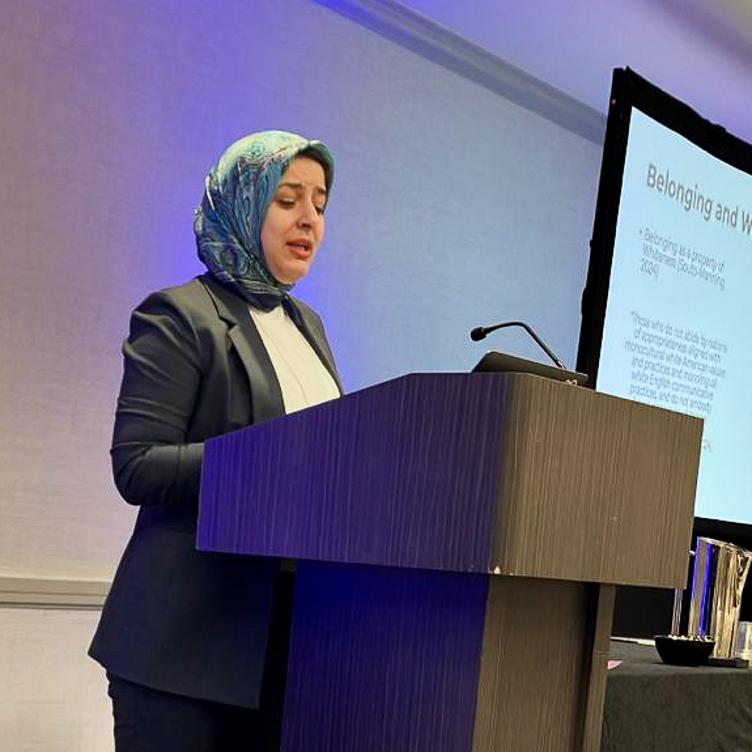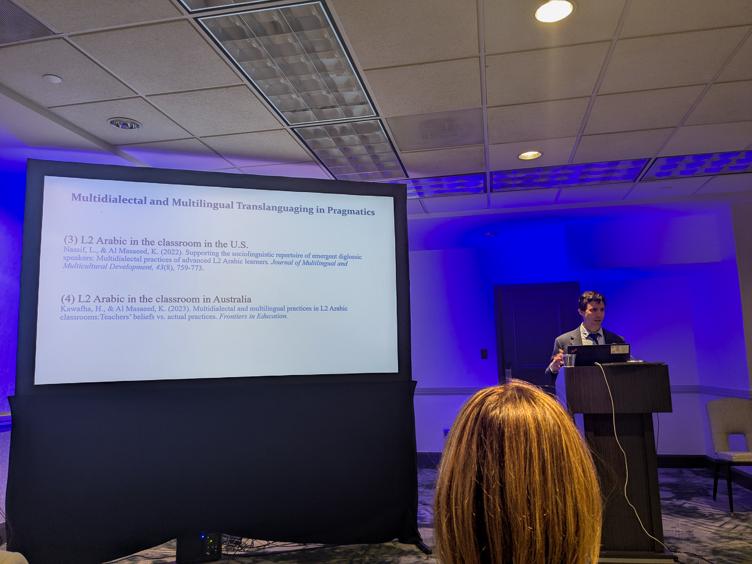
Something went Wrong
Try entering your email again or contact us at support@qfi.org
Try entering your email again or contact us at support@qfi.org
You’ll receive an email with a confirmation link soon.
Apr 8, 2025
Qatar Foundation International (QFI) recently participated in the annual American Association of Applied Linguistics (AAAL) conference, held from March 22-25 in Denver, CO, US. The event brought together scholars and educators from around the world to share and discuss new research in applied linguistics, with a focus on topics such as language education, acquisition and loss, bilingualism, and other critical language-related issues, through a variety of symposia, workshops, and plenary sessions.
QFI’s participation highlights its commitment to advancing research in Arabic language education and ensuring its representation in academic discourse. Specifically, by facilitating and supporting the presentation of Arabic language research at AAAL, QFI is helping to expand the field of Arabic education research, which is often underrepresented in applied linguistics. In addition to placing Arabic side by side with other more mainstream languages like Spanish or French, this effort strengthens the network of researchers and drives progress and innovation in Arabic language education.
At the conference, Georgetown University's Lourdes Ortega—a Professor of Linguistics, Director of the Initiative for Multilingual Studies, former AAAL President, and a Principal Investigator on a QFI-funded research project —led two colloquia that were accepted at AAAL. The first, titled Unsiloing Arabic Language Education Scholarship: Why All Applied Linguists Should Care, emphasized the need to move beyond English and North-Anglo-Eurocentric perspectives in Arabic language education research, particularly within North American academia. It underscored Arabic research’s relevance to applied linguistics while addressing challenges faced by Arabic-speaking communities, advocating for greater inclusivity.
Ortega emphasized, “Critical research in Arabic language education, which has long been overlooked in applied linguistics, is now gaining momentum. The work presented at AAAL not only highlights the unique challenges and opportunities in Arabic language learning but also underscores the importance of inclusive research practices that reflect the diversity of multilingual communities. This is a vital step toward ensuring that Arabic, a language of global significance, receives the scholarly attention it deserves.”
The second colloquium, titled Dual Language Bilingual Education (DLBE) in Non-Dominant Partner Languages: Expanding the Research Base, focused on DLBE programs for five globally spoken yet under-researched languages in the US, including Arabic. During the colloquium, Mahassen Ballouli, principal of Houston Independent School District’s Arabic Immersion Magnet School (AIMS), presented on Arabic dual immersion programs. AIMS is one of only four Arabic-English dual immersion public schools in the US.
In her talk, Ballouli addressed challenges such as maintaining student diversity and avoiding favoring any single Arabic dialect. Most notably, she shared that AIMS students consistently outperform their peers in both math and science at both the district and state levels. Her presentation highlighted how such programs successfully promote bilingualism, biliteracy, and cultural competence among both Arabic-speaking students and non-heritage speakers, despite obstacles like sustainability and equity, as well as the importance of tailored approaches to meet the needs of Arabic-speaking communities.
Ballouli stated, "As a principal of a DLBE Arabic program, I witness firsthand the challenges our schools face and can speak to the strategies critical to our success. Our DLBE program integrates language learning into all classroom topics, achieving remarkable results. Yet despite the program's demonstrated success, there remains a distinct lack of research on best practices and innovative approaches in Arabic language education. I urge AAAL attendees and other researchers to engage more deeply with Arabic DLBE programs and contribute to this vital scholarship."
QFI's participation in AAAL 2025 underscores its commitment to ensuring Arabic language education is represented in academic forums alongside other global languages. By supporting and presenting research at the conference, QFI addresses the underrepresentation of Arabic in applied linguistics and raises awareness of its significance. This initiative not only advances Arabic language education but also fosters a more inclusive academic environment, encouraging further research and innovation in Arabic teaching and learning.
Image 1 of 3
Learn more about QFI’s research initiatives here.
About Qatar Foundation International (QFI)
Qatar Foundation International (QFI), based in Washington, DC, is dedicated to advancing the value of teaching and learning Arabic as a global language.
About AAAL
The American Association for Applied Linguistics is a professional society of scholars from the United States, Canada, and over 50 other countries worldwide. Members use a wide variety of theoretical frameworks and methodological approaches to address a broad range of language-related issues that affect individuals, communities, and society.




